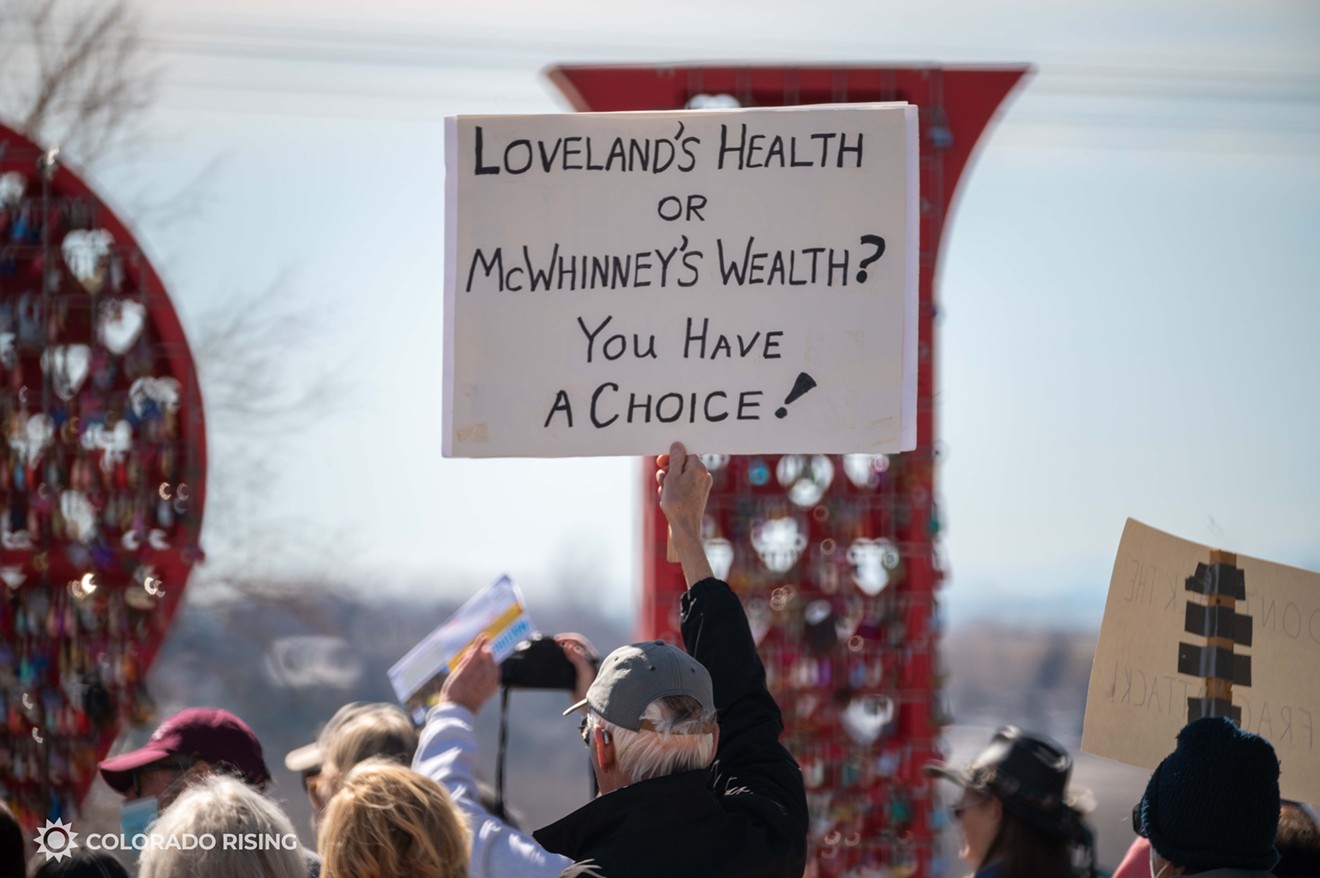On March 24, MRG — a McWhinney-owned entity in charge of a proposed fracking project in Loveland — submitted a permit request for its South Well Pad. By Monday, March 27, the application was gone.
Rather than being a case of weekend regrets, MRG made an “operational and development decision" to pull the permit request after obtaining new information about local development plans, says Barb Jones of GroundFloor Media, speaking on behalf of the company.
The proposed fracking pad would have been directly adjacent to a new Centerra South development that McWhinney, owned by longtime Colorado developers Chad and Troy McWhinney, is hoping Loveland City Council will greenlight in the coming weeks.
“The decision to withdraw the permit request was made following increased interest in additional retail, mixed-use and residential development within the planned Centerra South community,” MRG said in a release.
The South Well Pad is one of two fracking pads McWhinney was planning to install.
Between the two pads, there would be over twenty wells used to access minerals under the Lakes at Centerra — a residential McWhinney development that sits at the intersection of Interstate 25 and Highway 34 in Loveland.
When the fracking projects were proposed, residents of and near the Lakes at Centerra weren’t happy and questioned how it was okay for fracking to take place under the development, since it's a National Wildlife Federation-certified Community Wildlife Habitat. The area earned the designation by educating people about habitat restoration, making homes and community spaces animal-friendly, and encouraging native species in landscaping.
Tamara Fairbanks, a Centerra resident since 2016 who moved there in preparation for her retirement, was one of those concerned a year ago. She tells Westword the decision to scrap the south pad doesn’t encourage her much.
“I was happy to see the withdrawal, but I wonder if it was a concession of sorts to get Centerra South approved,” she says.
As proposed, the 149-acre Centerra South development would build a mixed-use community in Loveland with housing, a hotel and a Whole Foods, among other retail opportunities. However, Centerra South has faced delays from Loveland City Council as McWhinney has proposed to partially finance the development through an urban renewal plan.
The Lakes at Centerra was built under such a plan, in which taxing entities for the property — including Larimer County and the Thompson School District — can agree to divert property tax revenues in the area of the development for 25 years to help repay bonds sold for the project.
As reported in the Loveland Reporter Herald, Loveland City Council was meant to vote on the project March 21 but postponed to April 18 to give the involved entities more time to finalize the future tax-sharing agreements. The proposal already faced the additional roadblock of a February ruling by the Loveland Planning Commission, saying the Centerra South urban renewal plan isn’t consistent with the city’s comprehensive plan.
When asked how much public feedback factored into the decision to withdraw the fracking permit application for the South Well Pad, Jones merely reiterated that the decision was "an operational and development” one.
“I am also still concerned about the other location, which is larger,” Fairbanks says. “I wish McWhinney would withdraw both and create a nice solar farm instead.”
Jones confirmed to Westword that the fifteen-well East Pad is moving ahead, and city records show that Loveland's Development Review Team is still assessing the project.
“Based on initial review by the COGCC and the City, the CE application [for the East Pad] meets the City’s Enhanced Oil and Gas Guidelines,” the city noted in a release this week. “This means that the application will go through Track 2 of the Concept Review approval process.”
This all seemed to be the case last March, when McWhinney submitted its letters of intent for both projects. Loveland implemented enhanced standards for oil and gas development in 2018 to take into account further setbacks from other properties and more stringent air quality and noise considerations. Should a permit meet those requirements, it only needs to be approved by the city’s development director to move forward. It can’t be appealed to City Council, only in court.
[
{
"name": "Air - MediumRectangle - Inline Content - Mobile Display Size",
"component": "12017618",
"insertPoint": "2",
"requiredCountToDisplay": "2"
},{
"name": "Editor Picks",
"component": "17242653",
"insertPoint": "4",
"requiredCountToDisplay": "1"
},{
"name": "Inline Links",
"component": "18838239",
"insertPoint": "8th",
"startingPoint": 8,
"requiredCountToDisplay": "7",
"maxInsertions": 25
},{
"name": "Air - MediumRectangle - Combo - Inline Content",
"component": "17261320",
"insertPoint": "8th",
"startingPoint": 8,
"requiredCountToDisplay": "7",
"maxInsertions": 25
},{
"name": "Inline Links",
"component": "18838239",
"insertPoint": "8th",
"startingPoint": 12,
"requiredCountToDisplay": "11",
"maxInsertions": 25
},{
"name": "Air - Leaderboard Tower - Combo - Inline Content",
"component": "17261321",
"insertPoint": "8th",
"startingPoint": 12,
"requiredCountToDisplay": "11",
"maxInsertions": 25
}
]











